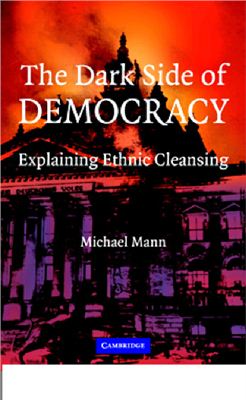Publisher: Cambridge University Press, 2004. 590 pages. Language:
English.
This book presents a new theory of ethnic cleansing based on the most terrible cases (colonial genocides, Armenia, the Nazi Holocaust, Cambodia, Yugoslavia, Rwanda) and cases of lesser violence (early mode Europe, contemporary India, and Indonesia). Murderous cleansing is mode, 'the dark side of democracy.' It results where the demos (democracy) is confused with the ethnos (the ethnic group). Danger arises where two rival ethno-national movements each claims 'its own' state over the same territory. Conflict escalates where either the weaker side fights rather than submit because of aid form outside, or the stronger side believes it can deploy sudden, overwhelming force. But the state must also have factionalized and radicalized by exteal pressures like wars. Premeditation is rare, since perpetrators feel 'forced' into escalation when their milder plans are frustrated. Escalation is not simply the work of 'evil elites' or 'primitive peoples.' It results from complex interactions between leaders, militants, and 'core constituencies' of ethno-nationalism. Understanding this complex process helps us devise policies to avoid ethnic cleansing in the future.
This book presents a new theory of ethnic cleansing based on the most terrible cases (colonial genocides, Armenia, the Nazi Holocaust, Cambodia, Yugoslavia, Rwanda) and cases of lesser violence (early mode Europe, contemporary India, and Indonesia). Murderous cleansing is mode, 'the dark side of democracy.' It results where the demos (democracy) is confused with the ethnos (the ethnic group). Danger arises where two rival ethno-national movements each claims 'its own' state over the same territory. Conflict escalates where either the weaker side fights rather than submit because of aid form outside, or the stronger side believes it can deploy sudden, overwhelming force. But the state must also have factionalized and radicalized by exteal pressures like wars. Premeditation is rare, since perpetrators feel 'forced' into escalation when their milder plans are frustrated. Escalation is not simply the work of 'evil elites' or 'primitive peoples.' It results from complex interactions between leaders, militants, and 'core constituencies' of ethno-nationalism. Understanding this complex process helps us devise policies to avoid ethnic cleansing in the future.

